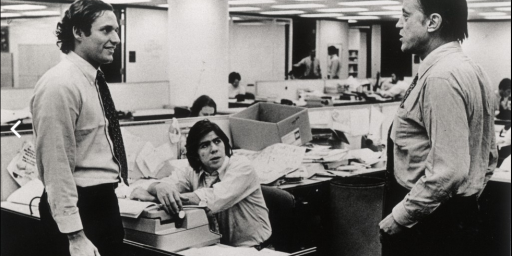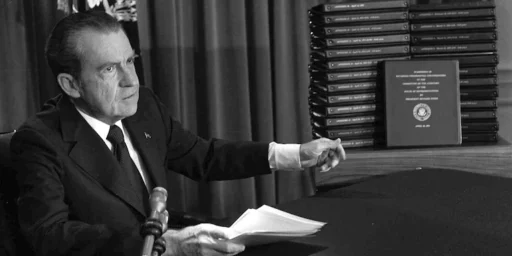David Broder Dead at 81
The legendary columnist David Broder has died.
The legendary columnist David Broder has died.
WaPo (“David Broder dies; Pulitzer-winning Washington Post political columnist“):
David S. Broder, 81, a Pulitzer Prize-winning columnist for The Washington Post and one of the most respected writers on national politics for four decades, died Wednesday in Arlington of complications from diabetes.
Mr. Broder was often called the dean of the Washington press corps – a nickname he earned in his late 30s in part for the clarity of his political analysis and the influence he wielded as a perceptive thinker on political trends in his books, articles and television appearances.
In 1973, Mr. Broder and The Post each won Pulitzers for coverage of the Watergate scandal that led to President Richard M. Nixon’s resignation. Mr. Broder’s citation was for explaining the importance of the Watergate fallout in a clear but compelling way.
As passionate about baseball as he was about politics, he likened Nixon’s political career to an often-traded pitcher who had “bounced around his league.”
He covered every presidential convention since 1956 and was widely regarded as the political journalist with the best-informed contacts, from the lowliest precinct to the highest rungs of government.
Sad news.
One of the interesting things about Broder is that he’s one of the few journalists to regularly attend the annual meetings of the American Political Science Association. I’m not sure how much he got out of them–I’m a political scientist and long since stopped going myself–but it speaks well of him that, after decades in the business, he thought he could learn from people who studied politics from a very different vantagepoint.
His name became something of an epithet on the Left, with “Broderism” used to describe a neutral and bland form of commentary that refused to call out truly bad conduct in the name of bipartisan objectivity. But Broder was simply a holdover from an era where journalists–even columnists–thought they were in the business of covering the news rather than making policy.







“His name became something of an epithet on the Left, with “Broderism” used to describe a neutral and bland form of commentary that refused to call out truly bad conduct in the name of bipartisan objectivity. But Broder was simply a holdover from an era where journalists–even columnists–thought they were in the business of covering the news rather than making policy.”
I’m not sure I see the disconnect between covering the news and calling out bad conduct. To the contrary, to me part of covering the news is informing your readers when someone is making stuff up or leaving out contrary evidence. Can you elaborate on why you think it should not be?
that refused to call out truly bad conduct in the name of bipartisan objectivity
That doesn’t really capture the critique. Broder placed “bipartisanship” – which was actually nothing more than his own thinly veiled beltway worldview and disgust with dirty effing hippies – as the supreme political virtue. This resulted in a plethora of absurd columns in which offenses of rhetoric and decorum were argued to be more outrageous than, say, a ruinous war.